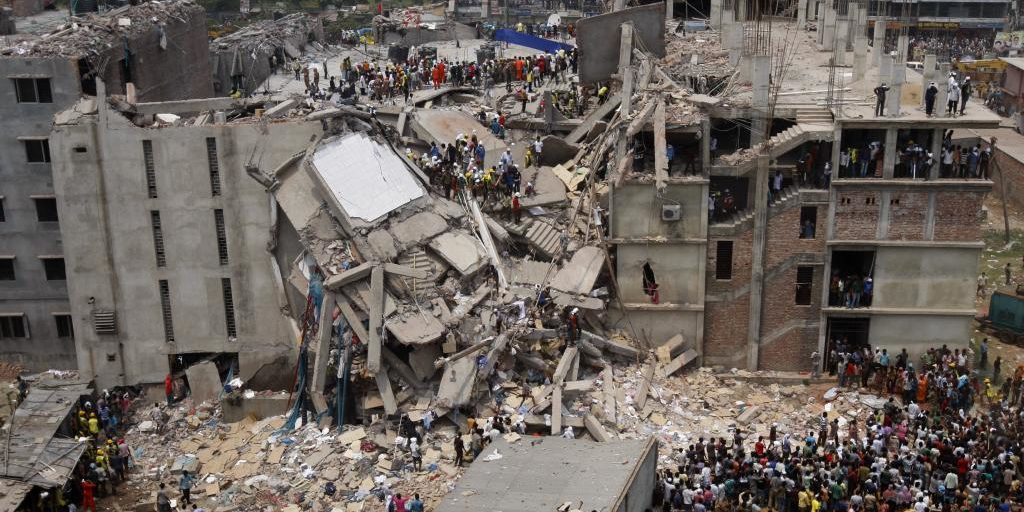In April 2013, at least 1,134 people died and 2500 were injured when an eight story commercial building called Rana Plaza collapsed in Savar, Bangladesh.
This was one of the worst industrial disasters the world has seen.
Workers had been raising the alarm about building safety before Rana Plaza collapsed. They were ignored.
The Canadian Labour Congress has been supporting workers rights organizations in Bangladesh for decades but after the Rana Plaza disaster, individual Canadian unions decided to do more.
The Canadian Labour Congress, the United Steelworkers (USW), CUPE, OSSTF, PSAC and UFCW have been working together to support on the ground efforts to demand change. One of the groups they work closely with is the Bangladesh Centre for Worker Solidarity (BCWS), an organization that has 93,000 members and was founded and is led by garment workers.
Lily Chang, Secretary Treasurer of the Canadian Labour Congress-(CLC-CTC), and Jocelyne Dubois, National Director of the CLC-CTC International Department, had just returned from a delegation to Bangladesh, hosted by the BCWS, when I caught up with them on July 28th. The following is based upon our conversation.
Two groundbreaking agreements were developed in Bangladesh the past nine years. The international labour movement worked with organizations on the ground and campaigned to make global apparel companies and other manufacturers pay $30 million US in compensation to families of the people killed and injured in Rana Plaza (read more about the Rana Plaza Arrangement).
On a larger scale, the international human rights and workers organizations developed the legally binding Bangladesh Accord on Fire and Building Safety in 2013. In 2021 a new version of the agreement was developed which has 176 global textile companies as signatories. Currently there is only one Canadian signatory to the 2021 Accord.
As of June 2022, there are 1,437 factories in Bangladesh which are covered by the new Accord. These groundbreaking accords pioneered a system of independent factory inspections, required remediation plans, and included an independent, confidential worker complaints mechanism. Supplier factories which have not implemented factory corrective action plans risk being made ineligible for business with Accord signatory brands. The 2021 Accord added more worker protections and expanded the original accord beyond fire and building safety.
All this is implemented by a joint corporate, government and worker representative body, which has become more government and corporate dominated over time . Nevertheless, the international community and the structures they have created have helped improve health and safety in some factories.
Bangladeshi garment workers are among the lowest paid workers in the world in the ready made garment sector. As Jocelyne pointed out “Despite finally gaining freedom of association on paper, there are difficulties with violence and reprisals against workers trying to form unions.” There have been wildcat strikes demanding better wages and conditions in textile factories, most recently 50,000 workers walked out in 2019, and many of the workers involved were arrested and dismissed.
The growing network of workers centres like BCWS and unions generally work to help workers secure rights that they already have on paper. Due to the campaigns in the past nine years, the rights of workers on paper have improved. For instance, there is a rule which states that childcare should be provided in factories over a certain size and the workers Lily and Jocelyne met were unionized women who were campaigning and demanding the factory implement this rule.
No one knows what the future will bring. Around 350,000 garment workers in Bangladesh lost their jobs during the COVID-19 pandemic. Mechanization in factories may be accelerating and reducing the need for labour. Despite promises from the Bangladesh government, unions continue to be illegal in export processing zones. However, putting pressure on international garment manufacturers (brands) has been a key strategy to protect workers in Bangladesh. So here is what you can do to keep the pressure on.
Only Loblaws has signed on to the current accord. Other Companies which source from Bangladesh, such as Canadian Tire and Hudson’s Bay Company initially followed the lead of American brands who refused to sign a binding agreement with trade unions, and joined the watered down Alliance for Bangladesh Worker Safety (which is no longer operating). Two Canadian companies, Bruzer Sportsgear Ltd. and Nelson Education Ltd., were on the 2013 Accord but have not signed the 2021 Accord. Reitmans and Lululemon, are among the companies that are not part of either initiative and source from in Bangladesh. The CleanClothes Campaign makes it easy to send messages to these companies and keep the pressure on to join the Accord so that their operations in Bangladesh can be held accountable.
In Canada, the labour movement wants the federal government to pass strong Mandatory Human Rights Due Diligence legislation in Canada. This would raise the standard for Canadian owned companies and require them review all their business activities to identify actual and potential risks to people and the environment, take steps to mitigate those risks and ensure remedy for those harmed. There have been positive steps in government but nothing has been passed as yet.
To improve the lives of working people around the world, we must do our part to ensure international corporations are putting resources into the system and are responsible for the people who produce their products. Lily Chang’s parting message was “The work done in Bangladesh is impressive but it must be expanded.” The CLC’s International Department will continue to coordinate efforts to support workers in Bangladesh and around the world.



